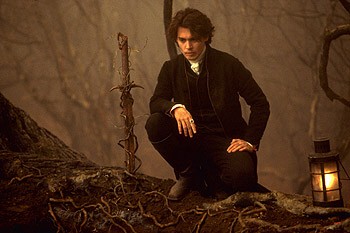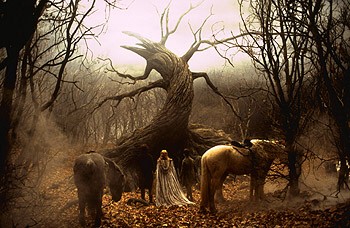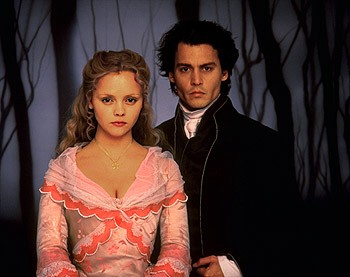

11/21/99
I really really really liked this movie a lot. Very scary. Very bloody. Many heads chopped off. Full review coming shortly. Hold on.


11/28/99
Now my full review. What a great movie. I saw this the day after seeing The World Is Not Enough - and what a contrast. For World, we get a sleepwalking director, Michael Apted. In Hollow, the director, Tim Burton, gives us a passionate, personal vision.
It could, of course, be argued, that World is simply just another James Bond movie and the director is simply handed pre-made characters, situations, bad puns, etc. and just calls out "Action!" and "That's a wrap!" No no no. Other movie series demonstrate that directors can leave their personal stamp on a mid-series film. Behold the wonders Nicholas Meyer bestowed on Star Trek II: The Wrath of Khan. His biggest gamble, of course, was daring to kill off a main character. Compare that to the dreck that was Star Trek V, directed by Captain Fatty himself, William Shatner, which proves that even a great series can be almost single-handed killed by a director, whose limited "talents" are stifled and crushed by the sheer weight of his own ego.
As I previously discussed in my review of World, the directorial problem was most evident in the action scenes (and here, folks, is where I set up the contrast with Hollow). The camera angles and editing merely conveyed the physical activity. We understand, oh, yes, helicopter zooms left, humans scamper right, random guy in black is shot and twirls into water. Splash. Fine. Anyone can convey the action; the artistry in movies is making the audience care. Subtle traits of character and surprising little details. At the end of Star Trek II, Spock, blinded and poisoned by radiation, right before giving his final dying words to his lifelong friend, pauses - pauses! - to straighten his uniform. Wow. There were no little character- and suspense-building details in World, but they were there in abundance in Hollow. In one scene, Johnny Depp, playing constable Ichabod Crane, is about to perform his analysis of a headless corpse, a crowd gathered round him. Just as he touches the body, a large black beetle crawls out. Both the audience and Crane are disgusted, and Crane turns away from his spectators for a moment. But then he soldiers on with his scientific study. That little detail, barely a moment of screentime, shows us how precariously Crane has balanced himself: a man disgusted and horrified by mortality, yet trying to maintain his scientific impartiality (and public persona thereof). It is so often our vulnerabilities and contradictions which make us human. And in that moment of screentime, both Johnny Depp and director Tim Burton completely won me over.
Burton also added these little touches to the action scenes, too. Most of these end like clockwork in decapitation; they could easily have become as dull and predictable as a redshirt dying in Star Trek. But these scenes of carnage remain constantly exciting and vigorous. In one sequence, for instance, a young frightened boy cowers underneath the floorboards of his house while the Horseman pursues his parents overhead. Then we hear the slice of the blade and a thump thump thump of a falling head. Then - and this is a great moment - we see the eyes of the woman's severed head - frozen open in fear - peering at her son through the space between the floorboards. Wow. In the Bond movie, we don't get cool stuff like this. Oh well.
Let me backtrack. If you've been reading closely, you may have noticed that many of these details are different from the original Washington Irving story, available free to all courtesy of the Internet. Some have quibbled over the changes made. Irving's Horseman's head "had been carried away by a cannon-ball" and he now uses his noggin as a projectile (!) against his victims; Burton's Horseman lost his head to a sword and now uses that weapon to decapitate. In Irving's original, Crane is a dapper schoolmaster, "inferior in learning only to the parson"; in the film, he's a scientifically-minded constable. In Irving's story, Crane "was a perfect master of Cotton Mather's History of New England Witchcraft, in which, by the way, he most firmly and potently believed." In Burton's version, Crane doesn't believe any of that superstitious hogwash until he sees the Headless Horseman with his own eyes. (In this way, Burton's Crane thus turns from Scully to Mulder.)
All told, I rather like Burton's changes. (I should note that the final screenplay credit is given to Andrew Kevin Walker, but it's hard not to see Burton's fingerprints all over it.) Irving's story, for my taste, has too many long dreary passages about the minutiae of Crane's life - such as his remarkable singing talents. There's only one encounter with the Headless Horseman, which is really why we still read the story anyway. Here are some excerpts from the climax:
On mounting a rising ground, which brought the figure of his fellow-traveller in relief against the sky, gigantic in height, and muffled in a cloak, Ichabod was horror-struck on perceiving that he was headless! but his horror was still more increased on observing that the head, which should have rested on his shoulders, was carried before him on the pommel of his saddle! His terror rose to desperation; he rained a shower of kicks and blows upon [his horse] Gunpowder, hoping by a sudden movement to give his companion the slip; but the spectre started full jump with him. Away, then, they dashed through thick and thin; stones flying and sparks flashing at every bound. Ichabod's flimsy garments fluttered in the air, as he stretched his long lank body away over his horse's head, in the eagerness of his flight. ...
"If I can but reach that bridge," thought Ichabod, " I am safe." Just then he heard the black steed panting and blowing close behind him; he even fancied that he felt his hot breath. Another convulsive kick in the ribs, and old Gunpowder sprang upon the bridge; he thundered over the resounding planks; he gained the opposite side; and now Ichabod cast a look behind to see if his pursuer should vanish, according to rule, in a flash of fire and brimstone. Just then he saw the goblin rising in his stirrups, and in the very act of hurling his head at him. Ichabod endeavored to dodge the horrible missile, but too late. It encountered his cranium with a tremendous crash, -- he was tumbled headlong into the dust, and Gunpowder, the black steed, and the goblin rider, passed by like a whirlwind.
Pretty good, but we have to wade through all that verbiage about singing to get to it. Though told well, this is hardly enough to sustain a two-hour movie. Hardly enough, even for a short-short like the animated Disney version from 1949, which stuffed in silly songs to pad the length. So Burton's film throws in a weird little mystery to keep the plot going and the body count up. Fine with me.
Burton's newest film fits in perfectly with the rest of oeuvre. Each film - Batman, Beetlejuice, Ed Wood, Edward Scissorhands - features a main character (or two) straddling two worlds: this present world v. the dark beyond, genius v. insanity, enthusiasm v. incompetence, individualism v. ostracism. Burton himself so often seems caught between trying to attract the audience and repel it. Events are often both hilarious and horrifying.
The changes Burton has made to Irving's story follow this pattern. Burton's Ichabod Crane stands in that twilight zone between reason and superstition, and the Horseman himself stands between this world and hell itself. It's a great place to be.
Overall: 9.0/10
Additional note: I should say that the film has bucketloads of splattered blood and the camera does linger on headless necks and neckless heads. If that ain't your thing, you've been warned. Stuff like that, if you're not into it, can really contaminate your enjoyment of a film. I remember watching 13th Warrior, which had an early scene with Vikings gargling and clearing their nasal passages into a common washing bowl, which was then passed around. Gross. I never really recovered from that scene for the rest of the film. I barely recovered from the barfing scene in Sixth Sense. I'm not bothered by splattered blood or goo like in the first Alien movie (which was too obvious Karo corn syrup), but I am by vomitus and projectile snot. Some folks are the opposite. Go figure. To each his own. You've been warned.
Additional Additional Note: Of interest to film fans is the presence of many veteran horror and science-fiction actors. Obviously Depp was in Nightmare on Elm Street, Ed Wood, Edward Scissorhands and The Astronaut's Wife; and Christina Ricci was in The Addams Family. But we also get Casper Starship Troopers van Dien as Ricci's token boyfriend, Christopher Dracula Has Risen from the Grave Lee as the Burgomaster, Christopher Prophecy Walken as the Horseman, Martin (I commanded Moonbase Alpha and Won an Oscar as Bela Lugosi) Landau as a redshirt, and even the evil Emperor Palpatine himself, Ian McDiarmid as the doctor. Can't beat that.

Agree or disagree? Please email me.
Back to Kitsch Tour U.S.A.
Back to Official Frank Wu Homepage